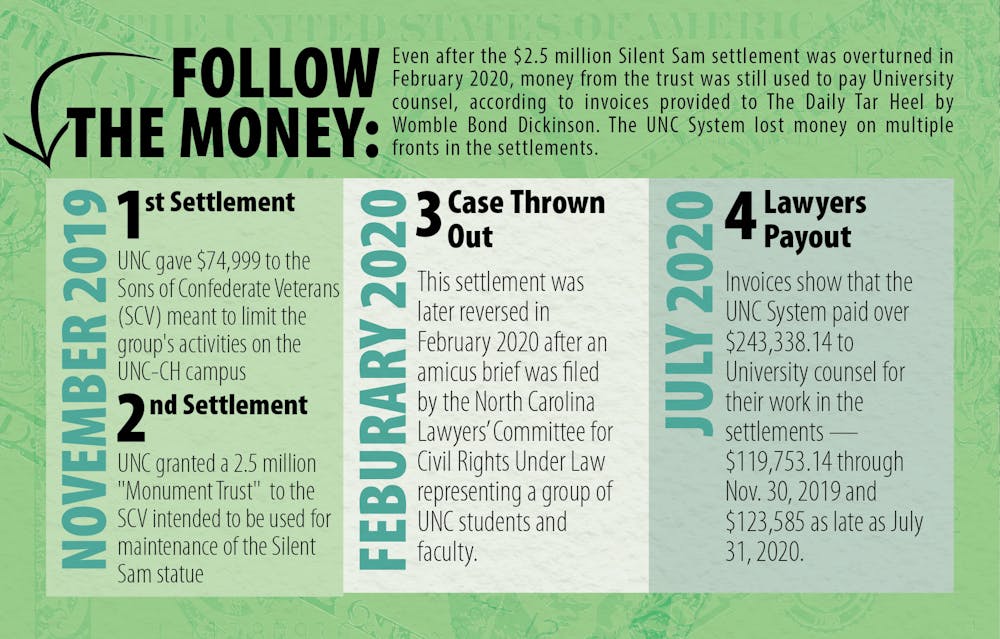The first settlement gave $74,999 to the SCV and was meant to limit the group's activities on UNC's campus, though it’s evident that the SCV spent some of those funds buying the rights to Silent Sam from the United Daughters of the Confederacy.
The amount of money paid by the UNC System in this settlement is just $1 below the amount that would prompt review by North Carolina Attorney General Josh Stein.
The second one was the $2.5 million settlement made with the SCV.
The second settlement was ruled void by Judge Allen Baddour in February 2020, following an amicus brief filed by a group of UNC students and faculty represented by the North Carolina Lawyers' Committee for Civil Rights Under Law. The UNC Black Pioneers also filed an amicus brief.
The DTH Media Corp v. UNC System lawsuit regarding violation of North Carolina Open Meetings Law in the Silent Sam deals was settled in February 2020. Money from the previous $74,999 settlement was also never returned to the system.
Community impact
With the money that the UNC System has spent on the Silent Sam settlements, many, including those who were filed amicus briefs, said that the system is funding white supremacist rhetoric.
The Lawyers' Committee for Civil Rights Under Law February 2020 amicus brief said that the Silent Sam settlements contradicted UNC's educational mission toward students.
“$2.5 million in University funds has been diverted from support of Amici’s education and teaching to further activities and goals that propagate white supremacist ideology and otherwise contradict the University’s mission,” the brief said.
The brief also mentioned the origins of the Silent Sam statue.
“It was part of a campaign by the United Daughters of the Confederacy (UDC) to re-write the history of the Civil War as the so-called 'Lost Cause' of a just southern struggle, and slavery as benevolent and benign,” the brief said.
In a campus message in February 2021, Chancellor Kevin Guskiewicz has previously said that he was not aware of the discussions regarding the UNC System's November 2019 settlement.
To get the day's news and headlines in your inbox each morning, sign up for our email newsletters.
Attorney General's Office
Nazneen Ahmed, a press secretary for Stein and the North Carolina Department of Justice, said in an email that attorney-client privilege limits what they can say on the issue, but that the Attorney General's Office will cooperate in releasing anything that UNC agrees to release.
Ahmed said the office was largely uninvolved in the settlements.
"We learned about the agreement the University and Board of Governors negotiated in this matter only after it occurred," Ahmed said. "That agreement was reached without our input — our office was sidelined as the Board of Governors hired outside counsel and negotiated this deal entirely on their own."
Ahmed said that no state funds were used in the settlements, and the office's role was limited to advising the University and the BOG on whether it was within their legal authority to enter the Silent Sam agreement.
UNC Media Relations directed all questions to the UNC System and the Attorney General's Office.
Jane Stancill, vice president of Communications for the UNC System, said in an email that specific information regarding the counsel and potential state involvement in the settlements will require an official public records request.
The DTH has filed a request for further information on alleged billing caps for outside counsel and state involvement in the settlements.
Remaining questions
The exact total amount of money that the UNC System lost on the Silent Sam settlements is unclear.
Given invoices on the fees paid to University counsel, the $74,999 deal and fees paid to non-UNC affiliated lawyers, the money that the UNC System lost on Silent Sam is at least $400,000.
"Amici are the direct and intended beneficiaries of the public funds at stake in this case," the Lawyers' Committee for Civil Rights brief said. "Their interests are also impacted by the Defendants’ betrayal of the University’s educational mission through the transfer of the Monument and 2.5 million dollars to support the propagation of white supremacist ideals and the false and destructive 'Lost Cause' narrative."
@natvarma
university@dailytarheel.com



